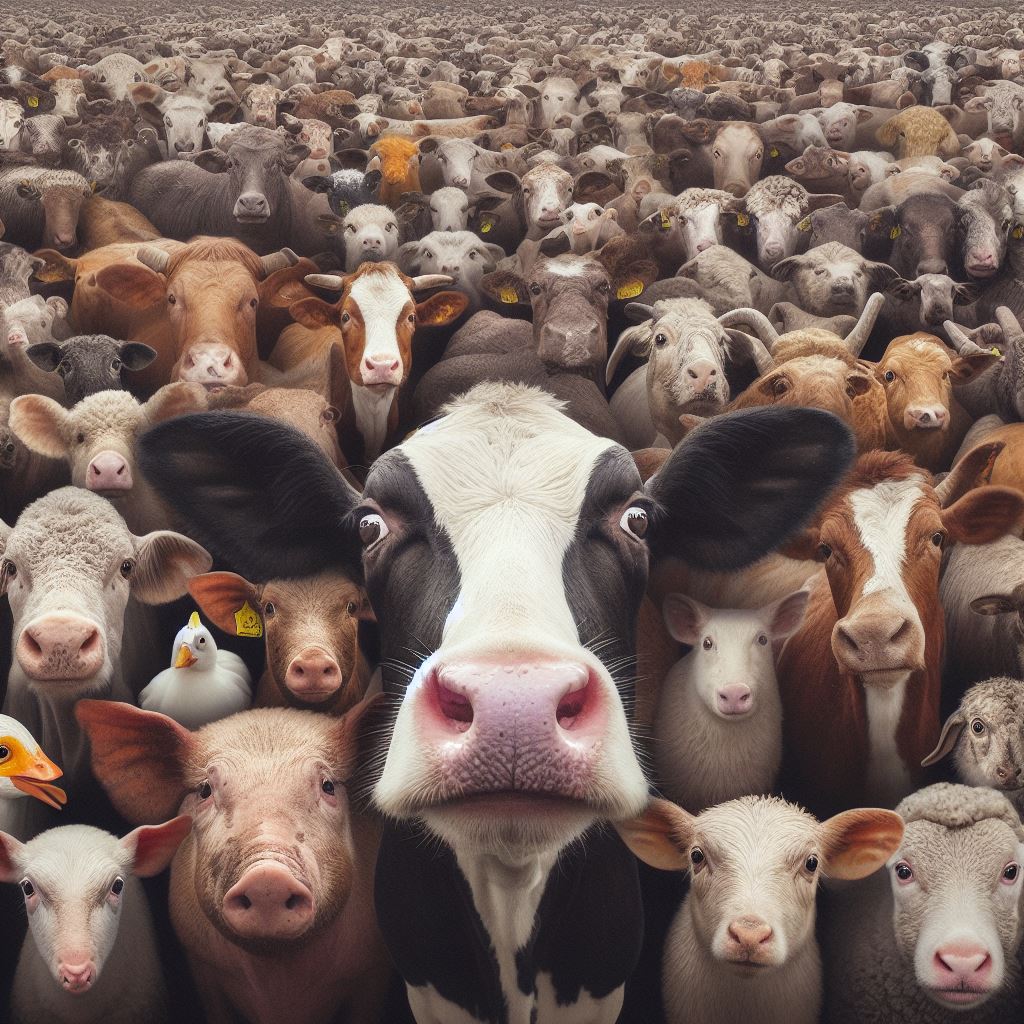PART 3
Why Be Vegan?
Sentience is a fundamental characteristic shared by all animals, including humans. It means we have the capacity to perceive and experience sensations, such as pleasure, pain, and emotions. If you’ve ever had a pet, whether a hamster, a fish or a dog, you’re likely to be aware of their ability to feel happiness, pain, and make preferences, just like we all do.
Veganism is a rejection of violence. It challenges the view that sentient animals are mere property or slaves to be fully exploited. Often, this exploitation is hidden from our direct awareness, with misleading narratives of happy animals leading wonderful lives and experiencing ‘humane’ deaths. However, the reality is quite different. Animals in slaughterhouses and factory farms desperately try to escape their fate. They cry out, showing clear signs of distress because they do not want to be in those places.
Animals lives are often defined by unimaginable suffering and then their lives are ended; either when they cannot any longer serve enough use to their masters, e.g. egg laying chickens, dairy cows, mules carrying loads, animals used for cosmetic testing; or when their bodies have reached just enough maturity to be utilised for whatever products can be made from their lifeless bodies, whether leather, meat, gelatine and so on.
As humans, we have empathy, so imagine putting yourself in the place of the victims — heading to a slaughterhouse, facing the terror, pain, and inevitable death, maybe consider the plight of a pig confined to a body sized farrowing crate or the crowded, stressful life of a chicken in a factory farm. Humans breed animals to grow rapidly and produce excessive eggs, milk, or wool, this is far from natural for the animals. So, even in what can appear to be picturesque settings, their lives can be rife with misery, living in bodies we have designed for our needs – not theirs.
As an illustration of our evolving relationship with animals, consider egg laying chickens. In their natural state (red jungle fowl), they would typically lay around twelve eggs a year and can live for twelve years or more. However, decades of selective breeding have transformed commercial egg-laying hens into prolific layers, producing around 300 eggs annually – nearly one a day. Yet, after just one year of intensive laying, the hen’s productivity starts to decline, hence the age for most commercial laying hens to be slaughtered and replaced. At any given moment, there are approximately 5 billion female chickens working tirelessly for us, to then only meet a grim end after a short life.
In the case of the male chicks, being incapable of laying eggs, they serve no purpose in the egg industry and are typically subjected to a gruesome fate— being shredded alive within 24 hours of birth. Shockingly, this practice results in a staggering death rate of 742,000 male chicks per hour or 6.5 billion per year.
Unfortunately, the harsh truth is that the vast majority of animals endure horrific conditions in their life and death, at the hands and demands of humans.
Veganism fundamentally opposes the exploitation of any sentient animal. Vegans advocate for the ethical treatment of animals because, like us, they have feelings and the capacity to suffer. They do not want to die. Simply put, they are not objects and should not be treated as such.
So, why choose veganism? Because it is a decision grounded in empathy, compassion, and the realization that we can lead fulfilling lives without inflicting unnecessary harm on the most vulnerable and oppressed.
Just as you wouldn’t wish to endure the suffering that humans inflict upon animals, these animals also long for lives free from harm and exploitation. If you wouldn’t wish to be subjected to needless exploitation and killing, why should it be any different for other sentient beings, whether they’re human or not? Consider why you would support such cruelty, suffering, and death when there is no genuine need to do so.
Upon realizing the extent and gravity of animal exploitation, it’s natural for non-vegans to develop a strong desire to discontinue their support for this systemic cruelty and transition to a vegan lifestyle. While this awakening and the subsequent transition may initially feel challenging, it’s important to remember that you are not the one being oppressed; rather, you are taking a stand against oppression.
Choosing veganism can be one of the most impactful and compassionate decisions you’ll ever make. The good news is that there is a wealth of help and support available to assist anyone as they become a vegan.
Veganism should be an easy choice for any compassionate person to make, especially because we know that a plant-based diet can provide all the necessary nutrition and resources for us to thrive without causing harm or suffering to sentient beings.

